|
|
|
Sort Order |
|
|
|
Items / Page
|
|
|
|
|
|
|
| Srl | Item |
| 1 |
ID:
167980
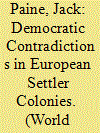

|
|
|
|
|
| Summary/Abstract |
How did political institutions emerge and evolve under colonial rule? This article studies a key colonial actor and establishes core democratic contradictions in European settler colonies. Although European settlers’ strong organizational position enabled them to demand representative political institutions, the first hypothesis qualifies their impulse for electoral representation by positing the importance of a metropole with a representative tradition. Analyzing new data on colonial legislatures in 144 colonies between the seventeenth and twentieth centuries shows that only British settler colonies—emanating from a metropole with representative institutions—systematically exhibited early elected legislative representation. The second hypothesis highlights a core democratic contradiction in colonies that established early representative institutions. Applying class-based democratization theories predicts perverse institutional evolution—resisted enfranchisement and contestation backsliding—because sizable European settler minorities usually composed an entrenched landed class. Evidence on voting restrictions and on legislature disbandment from Africa, the British Caribbean, and the US South supports these implications and rejects the Dahlian path from competitive oligarchy to full democracy.
|
|
|
|
|
|
|
|
|
|
|
|
|
|
|
|
| 2 |
ID:
167426
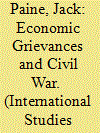

|
|
|
|
|
| Summary/Abstract |
A large body of scholarship suggests that economic grievances play an important role in civil wars. But what specific economic activities trigger such grievances, and why would governments not take proactive steps to limit economic grievances in order to stabilize their regimes? This article argues that specific economic activities—those that undermine a producer’s ability to exit the formal economy—cause governments to make taxation decisions that, despite the costliness of fighting, increase the likelihood of civil war. An inability for producers to exit the formal economy also undermines regional autonomy deals by encouraging governments to grab short-term rents despite the risk of triggering civil war. After deriving this “redistributive grievance” mechanism by analyzing an infinite-horizon bargaining model with endogenous labor supply and economic production, I address a specific empirical source of such redistributive grievances: oil-rich regions fight separatist civil wars relatively frequently. Capital-intense, geographically concentrated, and immobile oil production corresponds with conditions in the formal model that predict redistributive grievances and war. Moreover, I argue that applying the redistributive grievances mechanism to understanding the oil-separatism relationship also highlights shortcomings of alternative “greed”-based explanations.
|
|
|
|
|
|
|
|
|
|
|
|
|
|
|
|
| 3 |
ID:
168201
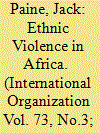

|
|
|
|
|
| Summary/Abstract |
What explains differential rates of ethnic violence in postcolonial Africa? I argue that ethnic groups organized as a precolonial state (PCS) exacerbated interethnic tensions in their postcolonial country. Insecure leaders in these countries traded off between inclusive coalitions that risked insider coups and excluding other ethnic groups at the possible expense of outsider rebellions. My main hypotheses posit that PCS groups should associate with coups because their historically rooted advantages often enabled accessing power at the center, whereas other ethnic groups in their countries—given strategic incentives for ethnopolitical exclusion—should fight civil wars more frequently than ethnic groups in countries without a PCS group. Analyzing originally compiled data on precolonial African states provides statistical evidence for these implications about civil wars and coups between independence and 2013 across various model specifications. Strikingly, through 1989, thirty of thirty-two ethnic group-level major civil war onsets occurred in countries with a PCS group.
|
|
|
|
|
|
|
|
|
|
|
|
|
|
|
|
| 4 |
ID:
191915


|
|
|
|
|
| Summary/Abstract |
This article describes and explains a previously overlooked empirical pattern in state revenue collection. As late as 1913, central governments in the West collected similar levels of per capita revenue as the rest of the world, despite ruling richer societies and experiencing a long history of fiscal innovation. Western revenue levels permanently diverged only in the following half-century. We identify the twentieth-century great revenue divergence by constructing a new panel data set of central government revenue with broad spatial and temporal coverage. To explain the pattern, we argue that sustainably high levels of revenue extraction require societal demand for an activist state, and a supply of effective bureaucratic institutions. Neither factor in isolation is sufficient. We formalize this insight in a game-theoretic model. The government can choose among low-effort, legibility-intensive, and crony-favoring strategies for raising revenues. Empirically, our theory accounts for low revenue intake in periods of low demand (the nineteenth-century West) or low bureaucratic capacity (twentieth-century former colonies), and for eventual revenue spikes in the West.
|
|
|
|
|
|
|
|
|
|
|
|
|
|
|
|
| 5 |
ID:
187658
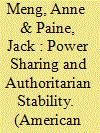

|
|
|
|
|
| Summary/Abstract |
Regimes founded in rebellion are, typically, extremely durable. We propose that this stability is founded upon peaceful power sharing between the rebel regime leader and military elites. Amid long and intense fighting, rebel leaders must delegate control to top military commanders because doing so helps them to win battles. After seizing power, power-sharing deals between former combatants are highly credible due to their history of interactions, which mitigates the guardianship dilemma. Elsewhere, a persistent internal security dilemma often undermines power-sharing deals. Using originally collected data on African regimes from 1960 to 2017, we establish that rebel regimes break down seldomly compared with other authoritarian regimes and they experience fewer coups. Regarding the mechanism, rebel regimes more frequently share power with military elites by appointing a Minister of Defense. These Ministers are typically high-ranking members of the rebellion, which reflects the regime’s replacement of the state military with their own.
|
|
|
|
|
|
|
|
|
|
|
|
|
|
|
|
| 6 |
ID:
187671
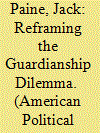

|
|
|
|
|
| Summary/Abstract |
Dictators confront a guardianship dilemma: military agents are needed to defeat mass outsider movements, but these agents can overthrow the ruler from within. In existing theories, rulers prioritize coup-proofing measures unless they anticipate strong outsider threats. Then dictators prioritize military competence. I reframe the guardianship dilemma around the central idea that militaries can choose between dual disloyalty options. In addition to staging a coup, militaries can defect by not fending off popular uprisings or rebellions. Dictators fear competent militaries not primarily because of their coup threat but instead because they often survive intact following a regime transition. Low motivation for competent militaries to save the ruler undermines their rationale of guarding against outsider threats, even if they pose a low coup threat. Consequently, rulers prioritize competence under narrow circumstances. Only radically oriented outsider movements that pose an existential threat to all regime elites induce loyalty from a competent military.
|
|
|
|
|
|
|
|
|
|
|
|
|
|
|
|
| 7 |
ID:
149129


|
|
|
|
|
| Summary/Abstract |
A broad literature on how oil wealth affects civil war onset argues that oil production engenders violent contests to capture a valuable prize from vulnerable governments. By contrast, research linking oil wealth to durable authoritarian regimes argues that oil-rich governments deter societal challenges by strategically allocating enormous revenues to enhance military capacity and to provide patronage. This article presents a unified formal model that evaluates how these competing mechanisms affect overall incentives for center-seeking civil wars. The model yields two key implications. First, large oil-generated revenues strengthen the government and exert an overall effect that decreases center-seeking civil war propensity. Second, oil revenues are less effective at preventing center-seeking civil war relative to other revenue sources, which distinguishes overall and relative effects. Revised statistical results test overall rather than relative effects by omitting the conventional but posttreatment covariate of income per capita, and demonstrate a consistent negative association between oil wealth and center-seeking civil war onset.
|
|
|
|
|
|
|
|
|
|
|
|
|
|
|
|
| 8 |
ID:
191907
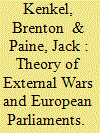

|
|
|
|
|
| Summary/Abstract |
The development of parliamentary constraints on the executive was critical in Western European political history. Previous scholarship identifies external wars as a key factor, but with varying effects. Sometimes, willing monarchs granted parliamentary rights in return for revenues to fight wars. Yet at other times, war threats empowered rulers over other elites or caused states to fragment. We analyze a formal model to understand how external wars can either stimulate or undermine prospects for a contractual relationship between a ruler and elite actors. We recover the standard intuition that war threats make the ruler more willing to grant parliamentary rights in return for revenue. Our key insight is that war threats also affect the bargaining position of elites. A previously unrecognized tension yields our new findings: stronger outsider threats increase pressure either on elites to fund the ruler or on the ruler to accept constraints—but not both simultaneously. Elites with immobile wealth depend on the ruler for security. War threats undercut their credibility to refuse funding for an unconstrained ruler. By contrast, war threats make elites with mobile wealth and a viable exit option unwilling to fund a hopeless war effort. Only under circumscribed conditions do war threats align three conditions needed for parliament to arise in equilibrium: ruler willingness, elite credibility, and elite willingness. We apply our theory to posit strategic foundations for waves and reversals of historical European parliaments.
|
|
|
|
|
|
|
|
|
|
|
|
|
|
|
|
|
|
|
|
|